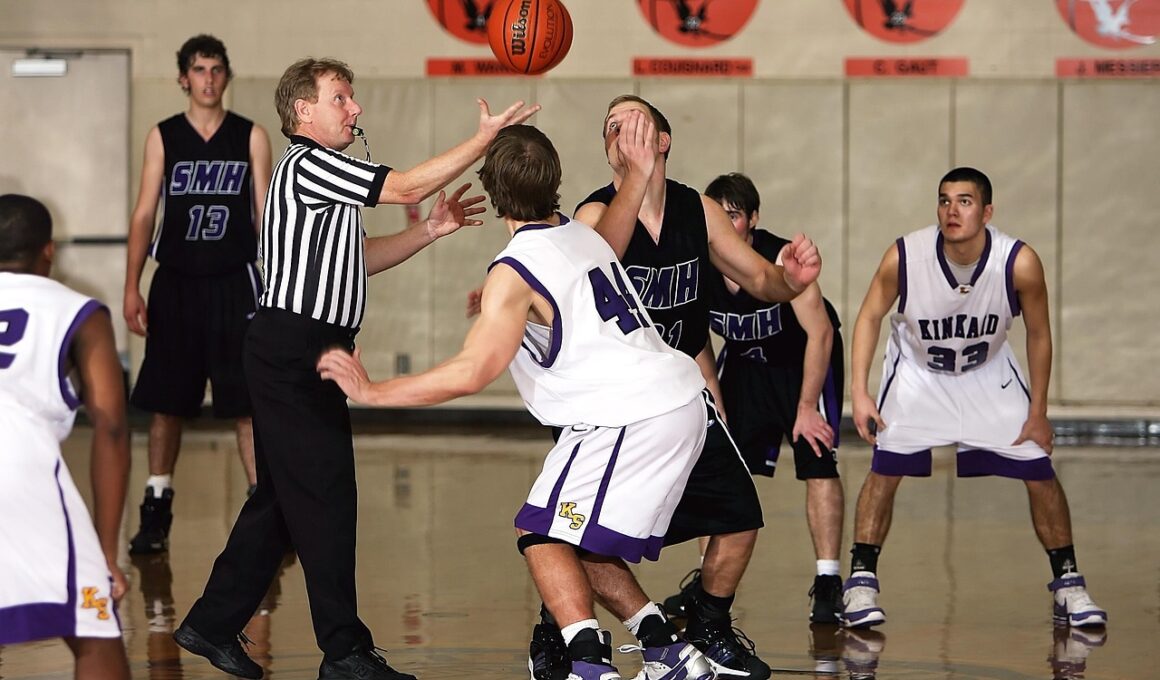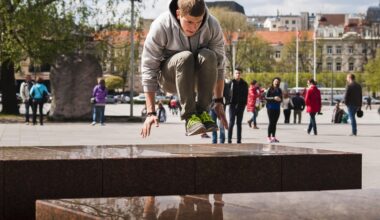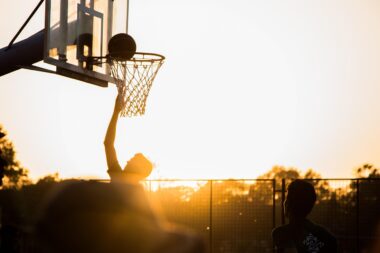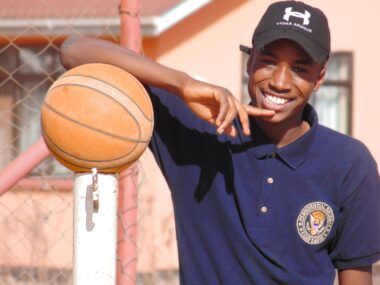Coaching Tips for Post Players
Effective coaching for post players requires a solid understanding of their roles on the court. Post plays are pivotal in creating scoring opportunities and rebounding, giving your team a competitive edge. Focus on developing essential skills like footwork and positioning. Emphasize getting open for passes and maintaining body control in the paint. Use drills that enhance their shooting accuracy, especially from close range. This helps them finish strong during games. Encourage them to use both hands when finishing, to enhance their versatility and unpredictability in the post. Additionally, communication is crucial; players must know when to call for the ball and recognize double teams. Remind them to maintain a low center of gravity to increase stability. Analyze their performance through video sessions, pointing out areas for improvement and reinforcing successful techniques. Teach them how to read defensive alignments and make quick decisions. This empowers them to exploit mismatches, whether by scoring or passing. In turn, this teamwork promotes a well-rounded offensive strategy. Engaging in consistent practice and following these strategies will significantly elevate their post-play skills.
Post players must also develop a strong defensive mindset. Effective defensive post play involves positioning, anticipation, and resilience. Encourage your players to maintain active hands to contest shots without committing fouls. Use drills that simulate game situations, focusing on how to defend against various offensive strategies. Remind them to box out effectively after a shot attempt, securing rebounds and minimizing second-chance points. Communication with teammates is essential to switch defensive assignments and identify screens. Teach them the importance of footwork and staying balanced when defending skilled offensive players. Encourage understanding of when to apply pressure and when to contain. This allows more aggressive play against less skilled opponents and a more conservative approach against star players. Video analysis can help illustrate successful defensive stances and areas needing refinement. Emphasizing the significance of reading the shooter’s eyes can lead to better shot contesting. Off-court conditioning is equally essential to boost endurance and agility. Ensure that players are aware of their body language on defense, as it can intimidate offensive players. A strong post defensive presence can significantly shift the momentum of games.
Improving Footwork
Great footwork is vital for post players to maneuver efficiently in the painted area. Conduct drills that focus on pivot moves and drop steps that allow players to create space for shots and passes. Encourage practicing both quick, explosive movements and slow, controlled movements to develop agility. Implement cone drills that enhance lateral quickness, enabling post players to establish position swiftly against defenders. Optimal footwork leads to better rebounding positions and improved scoring opportunities. Teach your players to stay on the balls of their feet, ready to react to shifting defenders. Practicing footwork should also include maintaining balance during challenging plays, like when being fouled or double-teamed. Repetition of foundational moves, such as jump hooks or turnarounds, will lead to muscle memory. Advanced techniques can include spin moves or up-and-under shots that will keep defenders guessing. Ensure that drills simulate real-game situations to build confidence. Footwork drills should also be paired with ball-handling exercises. This helps post players become more dynamic threats, combining agility with precise ball control. Ultimately, footwork can determine a player’s effectiveness in the post and can drastically affect game outcomes.
Incorporating passing skills into a post player’s development can elevate their game. Post players are often double-teamed, making their passing abilities crucial in creating scoring opportunities. Teach them to look for cutters and shooters once they catch the ball. Drills focused on passing out of the post can enhance their awareness and timing, fostering a true team-centric mindset. Encourage using bounce or overhead passes, taking note of spots where a teammate can efficiently receive the ball. Educate on reading defensive movements, knowing when to pass or when to shoot. Players must understand their teammates’ tendencies to maximize assist potential. Teach them to react to double-teams with quick decisions and strategic passes designed to exploit defenders. Integrate these skills with shooting drills, enabling players to recognize when to score versus when to assist. Video analysis can help highlight successful assist scenarios. Throughout practices, consistently emphasize the importance of unselfish gameplay. This awareness not only enhances personal skill but builds overall team chemistry. By developing passing skills, post players can transform into complete offensive threats. Such versatility allows them to significantly impact the game.
Understanding Game Strategy
Post players must grasp the overall game strategy to elevate their performance. Understanding how their role fits into team tactics can lead to better decisions on and off the court. Engage them in strategy discussions, demonstrating how recognizing trends can lead to success. Allow them to observe games, whether live or recorded, identifying flowing plays where they as post players can contribute. Teaching them to anticipate plays and be one step ahead enhances court IQ. This knowledge empowers them to react swiftly during fast breaks and transition points. Have players discuss their thoughts on opponent tactics, fostering a deeper understanding of basketball dynamics. Additionally, educate them on spacing principles, ensuring that they know the importance of maintaining optimal distances with teammates to open lanes. The effectiveness of a post player often hinges on creating space without the ball. Encourage communication during games, enhancing team coherence and collective strategic thinking. By combining on-court knowledge with practical experiences, players will become more effective in executing plays. Mastering the strategic aspect can set apart exceptional post players who can significantly impact their team’s success.
Focus on developing a strong mental game for post players to facilitate improvement. Building resilience can help them handle high-pressure situations on the court effectively. Teach them visualization techniques, allowing them to mentally rehearse successful plays before a game. Engaging in mindfulness practices can also enhance focus during games. Explain the importance of positive self-talk to combat negative thinking, especially after mistakes. Building confidence is essential, as it can directly impact gameplay, especially in challenging moments. Encourage journal writing to reflect on performances, identifying areas for growth and celebrating successes. This constructive approach fosters personal accountability among players. Furthermore, discuss the value of setting individual and team goals. Having clear, achievable objectives creates a sense of purpose while motivating players to strive for improvement. Remind post players to engage with coaches and teammates for guidance and support. Establishing open communication channels increases trust within the team, fostering a strong support system. In doing so, they can seek advice on coping strategies to manage game-related pressures. Ultimately, a strong mental game enables post players to perform consistently at their best, elevating their overall contributions.
Building Physical Conditioning
Finally, building a solid physical foundation is essential for post players. Conditioning impacts performance levels, including strength, endurance, and agility. Ensure that post players engage in tailored strength training programs, focusing on core and lower body exercises. This strengthens their ability to hold positions while defending or turning quickly toward the basket. Incorporate agility drills that boost foot speed and coordination. These drills include cone sprints and ladder drills, developing quick footwork and sharp decision-making. Additionally, emphasize cardiovascular conditioning to enhance in-game endurance. Incorporating running or circuit training can significantly benefit stamina levels during intense games. Ensure nutrition education supports their training efforts, explaining how proper fuel can influence performance levels. Hydration often plays a vital role, especially during hot games, and must not be overlooked. Adequate rest and recovery is equally important, providing muscles the chance to heal and grow. Highlight the significance of listening to their bodies and adapting conditioning elements accordingly. A well-rounded conditioning approach sets post players up for sustained success, enabling them to perform with power and agility consistently. This overall preparation can make all the difference during critical moments in every game.
By following these comprehensive coaching tips, you will be better equipped to help post players excel on the basketball court. Consistently practicing their skills, emphasizing teamwork, and understanding strategies will contribute to their overall growth in the sport. As a coach, fostering a positive environment encourages players to thrive. Beyond technical skills, focus on building confidence and resilience among your players. Nurturing player development will yield long-term benefits for the team and create a culture of commitment and improvement. Connecting with players on a personal level makes all the difference in helping them understand their potential. Celebrate their achievements, no matter how small, as this will boost their morale and enthusiasm. Being able to adapt coaching styles to individual needs is essential for maximizing performance. Building strong relationships creates trust, making players receptive to feedback. In implementing these strategies, you can cultivate skilled and mentally robust post players, ready to face any competition. Ultimately, the goal is to help them enjoy the game while continuously improving their abilities. This well-rounded approach toward coaching post players will yield positive results, impacting the team as a whole.





